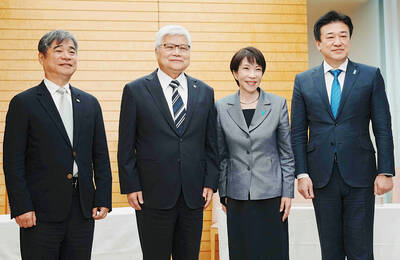A study conducted by the Taiwan Dental Association suggests that up to 80 percent of adults in Taiwan suffer from periodontal disease, with 47 percent suffering from serious periodontal disease without being aware of it.
The two-year study commissioned by the Ministry of Health and Welfare surveyed the oral health of 10,281 adults and discovered that adults in Taiwan have poor oral health overall.
The study found that the main oral health problem faced by people aged 18 to 34 is tooth decay, while it is tooth fillings for people aged 35 to 49, serious periodontal disease for people aged 50 to 64 and missing teeth for people aged 65 or older.
People aged 50 to 64 have the highest incidence rate of periodontal disease among all age groups, with their risk of periodontal disease about 6.7 times that of those aged 18 to 34.
The teeth of people aged 65 or older tend to become loose and fall out, with their average number of teeth being 18.61 — about 10 teeth fewer than the 28 that healthy adults have if their wisdom teeth have been removed.
Forty-seven percent of adults were found to have serious periodontal disease, said Huang Mao-shuan (黃茂栓), director of the Department of Dentistry at Taipei Medical University’s Shuang Ho Hospital, which hosted the project.
They had not sought medical attention because they did not have bad breath or suffer from any diseases, showing that the public’s awareness of oral health must be improved, Huang said.
Periodontal disease develops when dental plaque forms on teeth that are not thoroughly brushed. Bacteria in the dental plaque can accumulate and grow in the mouth, causing early symptoms of bad breath, loose teeth, and swollen and bleeding gums. Other symptoms include gum recession, deepening of crevices between the teeth and gums, exposed tooth roots, and tooth loss.
Other studies have shown that periodontal disease can affect general health, as harmful bacteria in the mouth produce an inflammation response, which can cause infection in other parts of the body and has been linked to cardiovascular disease, diabetes, myocardial infarction, stroke and other chronic diseases.
A national oral health study conducted in 2008 showed that up to 90 percent of adults in the nation had periodontal disease, Huang said, adding that the rate dropped to 80.48 percent in the latest study, showing that the government’s efforts to promote oral health have been effective, but that there is still much room for improvement.
The study suggested that smoking and chewing betel nuts are risk factors for periodontal disease and oral cancer.
People should have their teeth cleaned once every six months — a procedure funded by the National Health Insurance program — and brush their teeth every morning and before going to bed, Huang said, adding that to prevent periodontal disease, they should rinse their mouth after eating, avoid eating sweets and avoid smoking and chewing betel nuts.
The ministry conducts a national oral health survey every 10 years.
This year’s survey on the oral health of adults and the senior population used proportionate stratified random sampling to determine people’s oral health status and had them answer questionnaires to understand their oral health habits.

Right-wing political scientist Laura Fernandez on Sunday won Costa Rica’s presidential election by a landslide, after promising to crack down on rising violence linked to the cocaine trade. Fernandez’s nearest rival, economist Alvaro Ramos, conceded defeat as results showed the ruling party far exceeding the threshold of 40 percent needed to avoid a runoff. With 94 percent of polling stations counted, the political heir of outgoing Costa Rican President Rodrigo Chaves had captured 48.3 percent of the vote compared with Ramos’ 33.4 percent, the Supreme Electoral Tribunal said. As soon as the first results were announced, members of Fernandez’s Sovereign People’s Party

EMERGING FIELDS: The Chinese president said that the two countries would explore cooperation in green technology, the digital economy and artificial intelligence Chinese President Xi Jinping (習近平) yesterday called for an “equal and orderly multipolar world” in the face of “unilateral bullying,” in an apparent jab at the US. Xi was speaking during talks in Beijing with Uruguayan President Yamandu Orsi, the first South American leader to visit China since US special forces captured then-Venezuelan president Nicolas Maduro last month — an operation that Beijing condemned as a violation of sovereignty. Orsi follows a slew of leaders to have visited China seeking to boost ties with the world’s second-largest economy to hedge against US President Donald Trump’s increasingly unpredictable administration. “The international situation is fraught

Taiwan Semiconductor Manufacturing Co (TSMC, 台積電) plans to make advanced 3-nanometer chips in Japan, stepping up its semiconductor manufacturing roadmap in the country in a triumph for Japanese Prime Minister Sanae Takaichi’s technology ambitions. TSMC is to adopt cutting-edge technology for its second wafer fab in Kumamoto, company chairman C.C. Wei (魏哲家) said yesterday. That is an upgrade from an original blueprint to produce 7-nanometer chips by late next year, people familiar with the matter said. TSMC began mass production at its first plant in Japan’s Kumamoto in late 2024. Its second fab, which is still under construction, was originally focused on

GROWING AMBITIONS: The scale and tempo of the operations show that the Strait has become the core theater for China to expand its security interests, the report said Chinese military aircraft incursions around Taiwan have surged nearly 15-fold over the past five years, according to a report released yesterday by the Democratic Progressive Party’s (DPP) Department of China Affairs. Sorties in the Taiwan Strait were previously irregular, totaling 380 in 2020, but have since evolved into routine operations, the report showed. “This demonstrates that the Taiwan Strait has become both the starting point and testing ground for Beijing’s expansionist ambitions,” it said. Driven by military expansionism, China is systematically pursuing actions aimed at altering the regional “status quo,” the department said, adding that Taiwan represents the most critical link in China’s